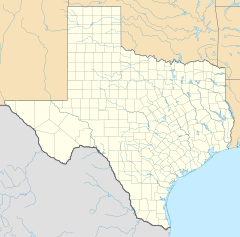Huntsville Unit
 |
|
| Location | 815 12th Street Huntsville, Texas 77342 |
|---|---|
| Coordinates | 30°43′19″N 95°32′44″W / 30.722027°N 95.545596°W |
| Status | Operational |
| Security class | G1–G3, Administrative Segregation, Transient |
| Capacity | 1,705 |
| Opened | 1849 |
| Managed by | Texas Department of Criminal Justice |
| Warden | Jones |
| County | Walker County |
| Country | USA |
| Notable prisoners | |
| Chad Butler ("Pimp C"), Duane "Dog" Chapman, John Wesley Hardin, Satanta, Doc Middleton Seth Wayne Campbell (first marriage on unit) | |
Texas State Penitentiary at Huntsville or Huntsville Unit (HV), nicknamed "Walls Unit", is a Texas state prison located in Huntsville, Texas, United States. The approximately 54.36-acre (22.00 ha) facility, near Downtown Huntsville, is operated by the Correctional Institutions Division of the Texas Department of Criminal Justice, administered as within Region I. The facility, the oldest Texas state prison, opened in 1849.
The unit houses the State of Texas execution chamber. It is the most active execution chamber in the United States, with 537 (as of April 2016) executions since 1982, when the death penalty was reinstated in Texas (see List of individuals executed in Texas).
The prison's first inmates arrived on October 1, 1849. The unit was named after the City of Huntsville. Robert Perkinson, the author of Texas Tough: The Rise of America’s Prison Empire, wrote that the unit was, within Texas, "the first public work of any importance".
Originally Huntsville Unit was only for white Texans; the only penalties available to black Texans were whipping and hanging. During the American Civil War, prisoners at Huntsville produced tents and uniforms for Confederate forces at the prison textile factory. After the Civil War ended, Huntsville Unit was the only prison in the former Confederate States of America to remain. Perkinson stated that the prison became, within the state, the "first racially integrated public institution".
Originally women in the Texas Prison System were housed in the Huntsville Unit. Beginning in 1883 women were housed in the Johnson Farm, a privately owned cotton plantation near Huntsville.
Historically the prison served as the administrative headquarters of the Texas Prison System and the Texas Department of Corrections; the superintendent and the other executive officers worked in the prison, and all of the central offices of the system's departments and all of the permanent records were located in the prison.
...
Wikipedia

